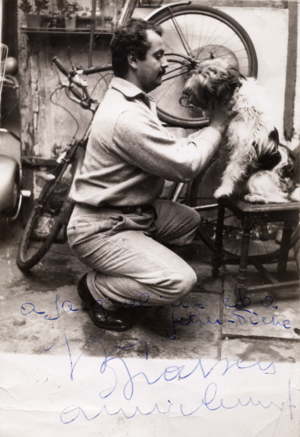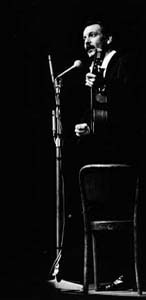Georges Brassens facts for kids
Quick facts for kids
Georges Brassens
|
|
|---|---|
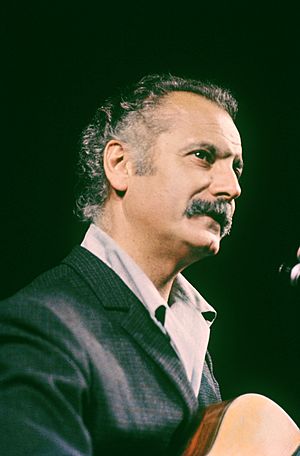
Georges Brassens in concert at the Théâtre national populaire, September–October 1966.
|
|
| Background information | |
| Birth name | Georges Charles Brassens |
| Born | 22 October 1921 Cette (now Sète), France |
| Died | 29 October 1981 (aged 60) Saint-Gély-du-Fesc, France |
| Genres | |
| Occupation(s) | Singer-songwriter |
| Instruments | Acoustic guitar, Piano, Organ, Banjo, Drums |
| Years active | 1951–1981 |
| Labels | Universal Music |
| Associated acts | Pierre Nicolas, sometimes Barthélémy Rosso, Joël Favreau |
Georges Charles Brassens (22 October 1921 – 29 October 1981) was a famous French singer, songwriter, and poet. He is known for his unique songs, which often featured his voice and guitar. His lyrics were clever and covered many different topics. Many people consider him one of France's most important poets after World War II. He also turned poems by other writers, like Victor Hugo, into songs.
During World War II, Georges Brassens was forced to work in a labor camp in Germany in 1943. There, he met friends who would become very important to him, like Pierre Onténiente. After getting a short leave to France, he decided not to go back to the camp. He found a hiding place in a small street in Paris called "Impasse Florimont." He stayed there for five months until the war ended, but he ended up living there for 22 years! The owner of the house, Jeanne Planche, and her husband, Marcel, inspired one of his songs, Jeanne.
Georges Brassens wrote and sang over a hundred of his own poems, usually with his guitar. From 1952 to 1976, he released fourteen albums. These albums included many popular French songs such as Les copains d'abord, Chanson pour l'Auvergnat, and La mauvaise réputation. Many of his songs use a type of humor called black humor and often show a love for freedom and questioning rules. In 1967, he received a major poetry award from the Académie française.
Contents
Georges Brassens' Early Life
Childhood and Family
Georges Brassens was born in Sète, a town in France. His father was French, and his mother was Italian. He grew up in Sète with his mother, Elvira, his father, Jean-Louis, and his half-sister, Simone. His grandmother, Jules, also lived with them. Georges's mother loved music and was always singing.
Life During Wartime
Forced Labor and Hiding
In March 1943, during World War II, Brassens was forced to work in Germany. While there, he wrote many songs and even started a novel. He met Pierre Onténiente, who became a close friend and later his personal assistant. Brassens nicknamed him "Gibraltar" because he was "firm as a rock."
After a year, Brassens got a ten-day leave to France. He decided not to return to Germany. He needed a place to hide in Paris. Jeanne Planche offered him a place to stay in her small, simple home. It had no gas, running water, or electricity. Brassens accepted and stayed there for 22 years, even though he only planned to stay until the war ended.
Ideas About Freedom
While hiding, Georges Brassens continued to write poems and songs. He used a small piece of furniture as a drum to help him with rhythms. After the war, he and his friends tried to start a newspaper about freedom, but it didn't last long. He also joined a group that believed in freedom and questioning rules. He wrote articles for their newspaper.
Brassens once said that someone who believes in freedom is "a man who carefully crosses at the zebra crossing, because he hates to argue with the agents." This shows his playful way of looking at rules.
Music Career
Georges Brassens's friends loved his songs and encouraged him to perform. He was shy at first and found it hard to sing in front of people. He even tried to sell his songs to other famous singers. Eventually, he met a singer named Patachou in a well-known cafe. She helped him get started in the music world. Many other famous singers, like Jacques Brel, also started their careers this way. Brassens later performed at famous venues in Paris, like the Paris Olympia.
He toured with Pierre Louki, who later wrote a book about their time together. After 1952, Brassens mostly stayed in France. He made a few trips to Belgium, Switzerland, Canada, and North Africa. He also performed in Wales in 1970 and 1973.
His Famous Songs
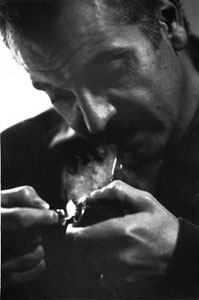
Brassens usually played his songs with just his acoustic guitar. Sometimes, his friend Pierre Nicolas played the double bass, and occasionally another guitar was added.
His songs often gently criticized people who were hypocritical or overly strict in French society at the time. This included religious people, the wealthy, and those in charge of laws. He used clever language and black humor, along with lively rhythms, to make even serious topics sound lighthearted.
Some of his most famous songs include:
- "Les copains d'abord" (Friends First): This song is about a boat and, more importantly, about friendship. He wrote it for a movie in 1964.
- "Chanson pour l'Auvergnat" (Song for the Auvergnat): This song praises people who help those in need, contrasting them with narrow-minded people and strict authorities.
- "La Cane de Jeanne" (Jeanne's Duck): This song was written for Marcel and Jeanne Planche, the couple who helped and sheltered him during the war.
- "La mauvaise réputation" (The Bad Reputation): This song is partly about his own life. It has a memorable line: "But the good folks don't like it if you take a different road than they do."
- "Les amoureux des bancs publics" (Lovers on Public Benches): This song is about young couples who show affection in public, which sometimes shocked more conservative people.
- "Pauvre Martin" (Poor Martin): This song describes the struggles of a poor farmer.
- "Supplique pour être enterré à la plage de Sète" (Request to be Buried on the Beach of Sète): This long, colorful song describes his wish to be buried on a specific sandy beach in his hometown.
- "Mourir pour des idées" (To Die for Ideas): This song talks about how people often fight over ideas and asks for peace.
Later Life and Passing
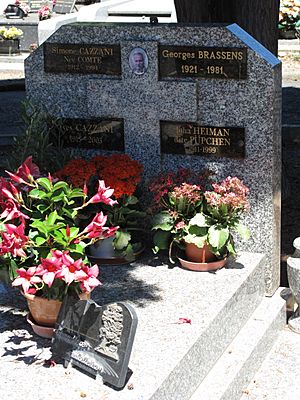
Georges Brassens had health problems for many years. He passed away from cancer in 1981. He is buried in the Cimetière Le Py in his hometown of Sète.
Georges Brassens' Legacy
Georges Brassens's music has influenced many artists around the world. Singers from Japan, Israel, Russia, the United States, Italy, and Spain have covered his songs. His songs have been translated into 20 different languages.
Many singers have covered his lyrics in other languages. For example, Pierre de Gaillande sings his songs in English, and Fabrizio De André sings them in Italian. There is an international fan club for Georges Brassens, and a fan club in Berlin-Basdorf holds a festival every September.
Brassens wrote about 250 songs, and 200 of them were recorded. The other 50 were never finished.
His songs have had a big impact on many French singers from different generations. In 2008, English folk singer Leon Rosselson released a tribute song called "The Ghost of Georges Brassens." The asteroid "6587 Brassens" was discovered in 1984 and named in his honor.
Places Named After Brassens
Many schools, theaters, parks, and public places are named after Georges Brassens and his work:
- L'Espace Brassens in his hometown of Sète is a museum dedicated to his life.
- A park in Paris, built on the site of old horse markets, was named Parc Georges-Brassens. Brassens lived very close to this area for a long time. The park opened in 1975.
- A tram station in Paris is also named after Brassens.
- The market square in Brive-la-Gaillarde was renamed Place Georges-Brassens because of his famous song Hécatombe, which mentions the market.
- In the Paris Métro station Porte des Lilas, there is a mural of Brassens with a quote from his song "Les Lilas." He even had a small role in the 1957 film Porte des Lilas, playing a character similar to himself.
Discography
Most of Georges Brassens's studio albums do not have official titles. They are often referred to by a number, or by the title of their first or most famous song.
Studio Albums
- 1952: La Mauvaise Réputation
- 1953: Le Vent (or Les Amoureux des bancs publics)
- 1954: Les Sabots d'Hélène (or Chanson pour l'Auvergnat)
- 1956: Je me suis fait tout petit
- 1957: Oncle Archibald
- 1960: Les Funérailles d'antan (or Le Mécréant)
- 1961: Le Temps ne fait rien à l'affaire
- 1962: Les Trompettes de la renommée
- 1964: Les Copains d'abord
- 1966: Supplique pour être enterré à la plage de Sète
- 1969: Misogynie à part (or La Religieuse)
- 1972: Fernande
- 1976: Trompe la mort (or Nouvelles chansons)
- 1979: Brassens-Moustache jouent Brassens en jazz (jazz versions of his songs)
- 1982: Georges Brassens chante les chansons de sa jeunesse (covers of old songs)
Live Albums
- 1973: Georges Brassens in Great Britain
- 1996: Georges Brassens au TNP (recorded in 1966)
- 2001: Georges Brassens à la Villa d'Este (recorded in 1953)
- 2001: Bobino 64
- 2006: Concerts de 1959 à 1976 (a collection of concerts from different years)
See also
 In Spanish: Georges Brassens para niños
In Spanish: Georges Brassens para niños
 | Precious Adams |
 | Lauren Anderson |
 | Janet Collins |


